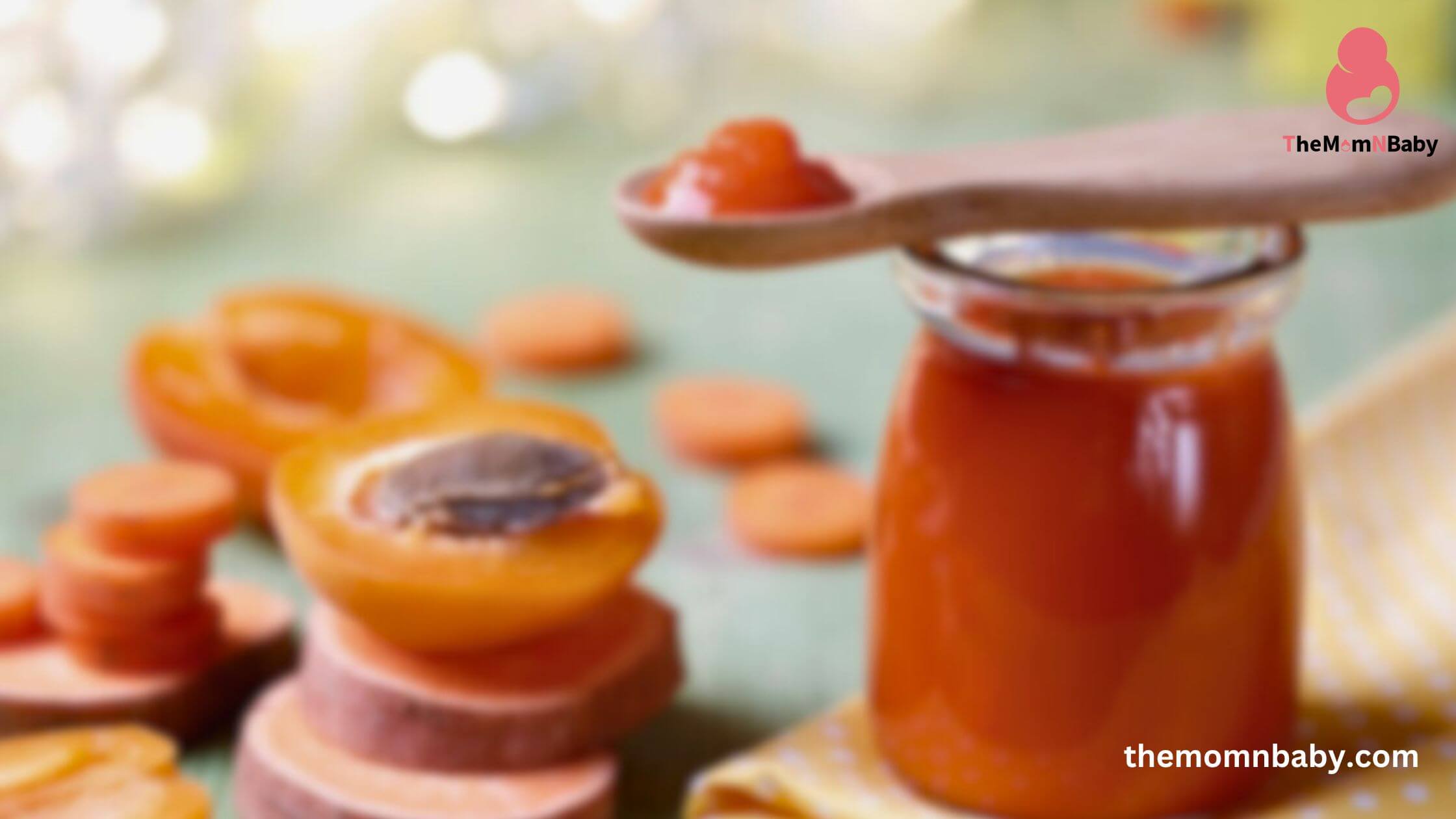
As moms and dads, our top concern is keeping our little ones healthy and happy. We want them to grow strong and smart. Lately, more and more people are realizing that the food we choose for our babies also affects the Earth. That’s why lots of parents are now choosing eco-friendly and organic baby food. In this article, we’ll learn more about what eco-friendly and organic baby food means, how it helps our babies and the environment, and we’ll get some helpful tips for picking the best options.
Understanding Eco-Friendly and Organic Baby Food:
Let’s start by understanding what eco-friendly and organic baby food means.
Firstly, “eco-friendly” baby food is all about being kind to our planet. It means choosing food for babies that doesn’t hurt the environment. The companies that make eco-friendly baby food use ingredients and ways of making the food that take care of nature. They think about things like where the ingredients come from, how much waste they make, and what kind of packages they use.
On the other hand, “organic” baby food is made from ingredients that are grown without using chemicals. Chemicals like pesticides and fertilizers can be harmful to our health and the Earth. Organic farmers use natural ways to grow the food without these harmful chemicals. So, when we choose organic baby food, we make sure it’s safe and good for our little ones.
Both eco-friendly and organic baby food are healthy choices for our babies and the planet. They show that we care about our babies’ well-being and the future of our Earth.
The Benefits of Eco-Friendly and Organic Baby Food for Babies:
Now, let’s talk about the benefits of these special baby food choices. First and foremost, eco-friendly and organic baby food offers higher nutritional quality compared to conventional options. Organic fruits and vegetables, for instance, tend to have more vitamins, minerals, and antioxidants due to the absence of chemical fertilizers, which can deplete nutrients in the soil. This means that our babies get the essential nutrients they need to grow strong and healthy.
Another significant advantage of eco-friendly and organic baby food is that it reduces babies’ exposure to harmful chemicals. As babies’ immune systems are still developing, they are more susceptible to the adverse effects of chemical residues found in conventionally grown foods. By choosing organic baby food, we can significantly reduce their exposure to harmful pesticides, herbicides, and other potentially toxic substances, thus promoting their overall health and well-being.
Furthermore, eco-friendly and organic baby food minimizes the risk of allergies. These foods avoid the use of genetically modified ingredients and common allergens, reducing the chances of allergic reactions in babies with sensitive immune systems. This is particularly important since allergies can cause discomfort and affect our babies’ quality of life.
Additionally, opting for eco-friendly and organic baby food means providing our little ones with food that is easier to digest. Organic baby food is free from synthetic additives and preservatives, making it gentler on their delicate tummies. As a result, they may experience fewer tummy troubles, such as colic or constipation, making mealtime a more enjoyable experience for both babies and parents.
Moreover, research suggests that a diet rich in organic foods during early childhood may contribute to better long-term health outcomes. This includes a reduced risk of chronic diseases later in life, giving our babies a healthier future ahead.
The Benefits of Eco-Friendly and Organic Baby Food for the Environment:
Now, let’s see how picking eco-friendly and organic baby food can also be good for our planet.
Firstly, sustainable farming practices play a big part in making organic baby food. These practices take good care of the soil, save water, and protect animals and plants. They make sure there is a good balance in nature. When we support sustainable farming, we help create a healthier environment for the future.
Secondly, eco-friendly baby food often uses ingredients from nearby places. This way, the food doesn’t have to travel long distances, and that’s good for the Earth. It means less pollution from cars and trucks, which is better for the air we breathe. So, by choosing eco-friendly baby food, we also help fight climate change and make the air cleaner, making it good for everyone, not just our babies.
Moreover, picking organic baby food also helps reduce the bad chemicals in the soil, water, and air. Sometimes, regular farming uses harmful chemicals that can hurt animals and plants. By choosing organic food, we make sure these harmful chemicals stay away, and that keeps the environment safer and healthier for all living things.
Lastly, when we choose eco-friendly and organic baby food brands, we help the food industry become more eco-conscious.
By supporting these brands, we show that we like their good practices. This makes other companies want to do the same things. As more people want eco-friendly and organic baby food, more companies will start using sustainable ways to grow food.
This change is great for everyone! It means better food for our babies, and it also helps the whole food system become more responsible towards the environment. So, by making good choices for our little ones, we create a positive impact on the world around us.
Want to know the benefits of organic baby food for your little one?
Now that we understand the many benefits of eco-friendly and organic baby food, let’s explore some tips to help us make informed choices:
Tips for Choosing Eco-Friendly and Organic Baby Food:
1. Read Labels Carefully:
- When shopping for baby food, read the labels carefully. Look for baby food products that are certified as organic by recognized organic certification agencies. Checking the ingredient list is also essential to ensure that it contains natural, organic ingredients.
2. Choose Locally Sourced Products:
- Opt for baby food brands that prioritize locally sourced ingredients. Buying from local farmers not only supports them and the local economy but also reduces the carbon footprint associated with transportation.
3. Consider Homemade Options:
- You can even make baby food at home! Grab some organic fruits and veggies, blend them up, and voilà – you’ve got a homemade treat for your little one. It’s fun, it’s easy, and it’s super rewarding!
4. Research Eco-Friendly Brands:
- Take the time to research and support baby food brands that have a strong commitment to eco-friendly and sustainable practices. Look for those that use eco-conscious packaging and have transparent sourcing policies. Supporting such brands is a way to vote with our wallets and drive positive change in the industry.
5. Focus on Nutrient Content:
- Ensure that the baby food you choose provides essential nutrients like iron, calcium, and vitamins necessary for your baby’s healthy development.
6. Check for Allergens:
- Be mindful of any potential allergens in the baby food ingredients and introduce new foods one at a time to monitor your baby’s reactions.
7. Trust Your Instincts:
- As a parent, you know your baby best. Trust your instincts and choose the options that align with your values and beliefs about sustainability and eco-friendliness.
Want to try making homemade baby food using organic ingredients?
Here’s a list of organic baby food options:
- Organic Fruit Purees: Apple, Banana, Pear, Mango, Blueberry
- Organic Vegetable Purees: Sweet Potato, Carrot, Pea, Butternut Squash, Spinach
- Organic Mixed Blends: Apple & Banana, Pear & Spinach, Sweet Potato & Carrot, Apple, Blueberry & Oatmeal, Mango, Pineapple & Kale
- Organic Baby Cereals: Brown Rice, Oatmeal, Multigrain
- Organic Baby Snacks: Rice Puffs, Teething Biscuits, Fruit Snacks, Veggie Straws
- Organic Baby Meals (Stage 2 and 3): Chicken & Sweet Potato Puree, Beef & Vegetable Stew, Turkey & Quinoa Casserole, Lentil & Vegetable Curry
Check- list for choosing eco-friendly and organic baby food:
- Check Labels: Look for “organic” and “eco-friendly” labels on baby food products.
- Locally Sourced: Choose brands that use locally sourced ingredients to reduce transportation emissions.
- Eco-Conscious Packaging: Opt for products with eco-friendly and recyclable packaging.
- Certified Organic: Ensure the baby food is certified organic by recognized organizations.
- No GMOs or Allergens: Avoid products with genetically modified ingredients and common allergens.
- Minimal Processing: Choose baby food with minimal processing to retain nutrients and flavors.
- Homemade Options: Consider making baby food at home using organic ingredients.
- Research Brands: Support brands committed to eco-friendly and sustainable practices.
- Read Reviews: Check online reviews and ask other parents for recommendations.
- Consult Pediatrician: Discuss baby’s dietary needs with a pediatrician for guidance.
- No Added Sweeteners or Salt: Avoid baby food with added sugars or excessive salt.
- Age-Appropriate: Choose food suitable for baby’s age and developmental stage.
- Support Sustainability: By choosing eco-friendly and organic baby food, support companies that care for the environment.
What’s the difference between regular baby food and eco-friendly options?
Have you ever wondered how eco-friendly baby food is different from regular baby food? Well, eco-friendly baby food is made with special care for the environment. It uses natural and healthy ingredients, and its packaging is more environmentally friendly. Let’s explore what makes these greener options stand out from the regular ones. It’s all about being kind to both babies and the planet!
Regular Baby Food:
- Made using conventional farming methods.
- Ingredients may come from farms that use synthetic pesticides, fertilizers, and GMOs.
- Potential harm to the environment due to pollution and soil degradation.
- Packaging may include single-use plastics and non-recyclable materials.
Eco-Friendly Baby Food:
- Made with a focus on sustainability and minimal environmental impact.
- Ingredients come from organic farms using natural farming methods without harmful chemicals.
- Promotes soil health, water conservation, and biodiversity.
- Uses eco-conscious packaging, often recyclable or biodegradable materials, to reduce waste and pollution.
In conclusion, eco-friendly and organic baby food offers numerous benefits for both babies and the environment. From better nutritional quality and reduced exposure to harmful chemicals to supporting sustainable farming practices and lowering our carbon footprint, these choices contribute to a healthier future for our little ones and the planet. As responsible parents, embracing eco-friendly and organic baby food is a meaningful step towards nourishing our babies with care while safeguarding the environment for generations to come. By making informed choices and supporting environmentally conscious brands, we can ensure that our little bundles of joy grow up healthy, happy, and surrounded by a thriving planet. Let’s cherish our little ones and leave them a brighter world to inherit!
Also Read : Child And Eczema






